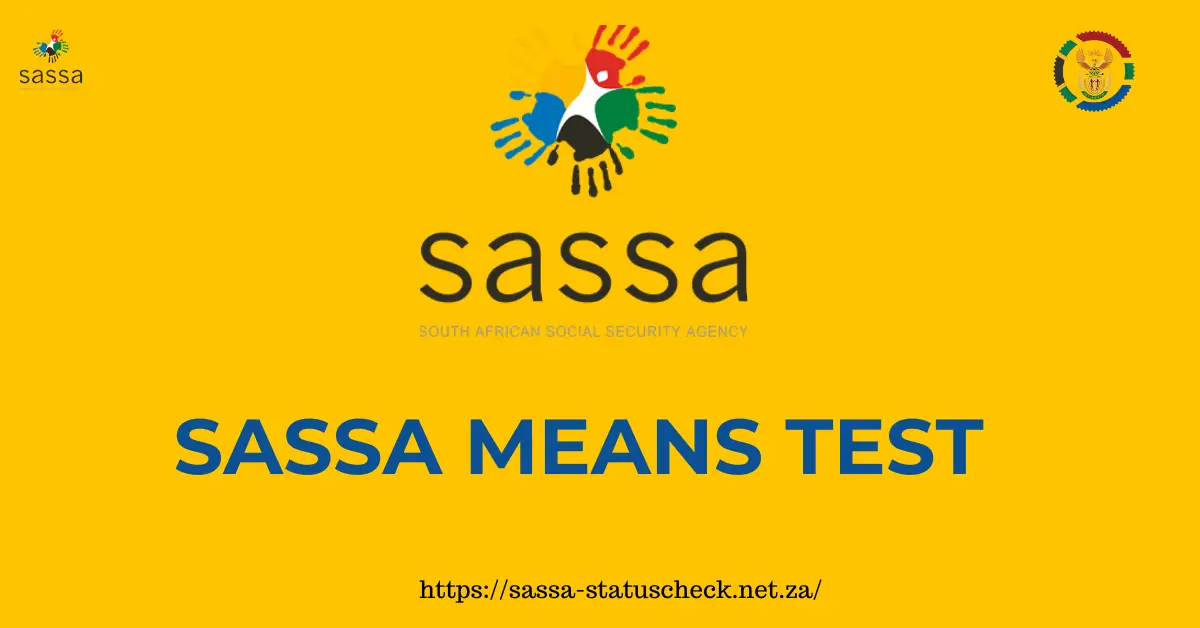The national agency adopted the Sassa Means Test for social grant application approval and verification, specifically for the SASSA R350 grant and social grants in South Africa. This test is an essential tool for verifying the eligibility of each and every applicant, guaranteeing that those who truly require financial assistance receive it and rejecting those who do not meet the requirements by having assets and income levels above the threshold.
One important procedure that determines your eligibility for aid is the SASSA Means Test. It makes sure that your income stays below the set amount and that you aren’t getting any extra help with money from sources like UIF payments for social grants or the R350 Social Relief of Distress (SRD) grant.
SASSA Means Test
To make the main components of the SASSA Status Check procedure easy for you to comprehend. You will gain knowledge on all aspects of the Means Test and how it establishes if you are a qualified recipient who lacks the resources to sustain your family. To see how the SASSA Means Test affects your eligibility, you can review the information available.
How Does the SASSA Means Test Work?
The means test involves a thorough examination of an applicant’s financial status. Here are the key steps involved in the process:
- Application Submission: The process begins when an individual submits an application for a social grant. This application includes detailed information about their income, assets, and household composition.
- Income Assessment: SASSA assesses the applicant’s income from all sources, including wages, pensions, investments, and any other earnings. The income threshold varies depending on the type of grant being applied for. For example, the income threshold for the old age pension is different from that of the child support grant.
- Asset Evaluation: In addition to income, SASSA evaluates the applicant’s assets, such as property, vehicles, and savings. Certain assets may be excluded from this evaluation, depending on the specific grant’s criteria.
- Household Composition: The means test also takes into account the household composition. This includes the number of dependents and other members living in the household. The combined income and assets of the household are considered in determining eligibility.
- Comparison with Thresholds: SASSA compares the assessed income and assets against predetermined thresholds. If the applicant’s financial situation falls below these thresholds, they qualify for the grant. If it exceeds the thresholds, the application is denied.
Types of Grants Subject to the Means Test
Several types of social grants in South Africa require applicants to undergo the means test. These include:
- Old Age Pension: Provides financial support to elderly individuals who meet the income and asset criteria.
- Disability Grant: Assists individuals with disabilities who are unable to support themselves financially.
- Child Support Grant: Offers financial aid to caregivers of children under 18 who fall within the income threshold.
- Foster Child Grant: Supports caregivers of foster children with financial assistance.
- Care Dependency Grant: Helps caregivers of children with severe disabilities who require permanent care.
SASSA SRD R350 Threshold Means Test
The SASSA means test for the R350 Income and Assets Threshold is necessary if you’re applying for the R350 grant, which is intended to provide short-term assistance to people experiencing financial hardships and unemployment. This is done to make sure that funding is allocated to people who are truly in need but have insufficient resources.
Important Announcement by SASSA Team for R350 Applicants
New guidelines have been updated for the COVID-19 SRD R350 Means Test grant. For the COVID-19 SRD, the means test income threshold has been raised from R350 to R624.
In order to be eligible for the SRD R350 grant, people must have received no more than R624 in incoming funds for that specific month in their bank accounts.
A person is considered eligible for the SASSA SRD grant if their income is less than R624. SASSA verifies the income status of recipients by checking their bank accounts on a monthly basis.
Conclusion
The SASSA Means Test is a crucial mechanism in South Africa’s social grant system, ensuring that financial assistance is provided to those who truly need it. This test evaluates an applicant’s income, assets, and household composition to determine their eligibility for various social grants, including the Old Age Pension, Disability Grant, Child Support Grant, Foster Child Grant, and Care Dependency Grant. For the SASSA SRD R350 grant, specifically aimed at providing temporary relief to those facing financial hardship and unemployment, the means test ensures that applicants with incoming funds below R624 per month are eligible. This process involves a comprehensive assessment of the applicant’s financial status to guarantee that resources are allocated fairly and effectively, supporting the most vulnerable members of society.

